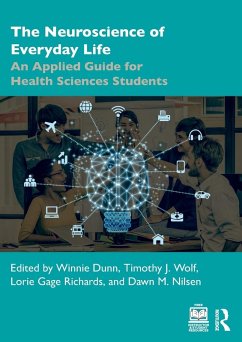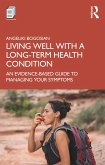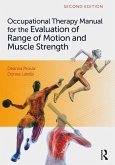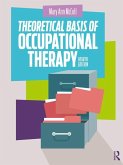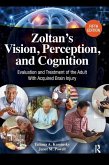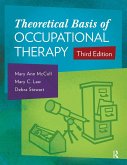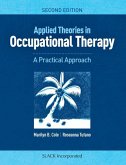The Neuroscience of Everyday Life
An Applied Guide for Health Sciences Students
Herausgeber: Nilsen, Dawn M.; Dunn, Winnie; Wolf, Timothy J.; Richards, Lorie Gage
The Neuroscience of Everyday Life
An Applied Guide for Health Sciences Students
Herausgeber: Nilsen, Dawn M.; Dunn, Winnie; Wolf, Timothy J.; Richards, Lorie Gage
- Broschiertes Buch
- Merkliste
- Auf die Merkliste
- Bewerten Bewerten
- Teilen
- Produkt teilen
- Produkterinnerung
- Produkterinnerung
By weaving vignettes and case studies throughout, this fascinating and original textbook provides an accessible primer not only on the key principles of neuroscience but, crucially, how they may manifest in the everyday lives of people with neurological conditions.
Andere Kunden interessierten sich auch für
![Living Well with A Long-Term Health Condition Living Well with A Long-Term Health Condition]() Angeliki Bogosian (UK City University)Living Well with A Long-Term Health Condition33,99 €
Angeliki Bogosian (UK City University)Living Well with A Long-Term Health Condition33,99 €![Notes From A Friend Notes From A Friend]() Tony RobbinsNotes From A Friend16,99 €
Tony RobbinsNotes From A Friend16,99 €![Occupational Therapy Manual for the Evaluation of Range of Motion and Muscle Strength Occupational Therapy Manual for the Evaluation of Range of Motion and Muscle Strength]() Deanna ProulxOccupational Therapy Manual for the Evaluation of Range of Motion and Muscle Strength100,99 €
Deanna ProulxOccupational Therapy Manual for the Evaluation of Range of Motion and Muscle Strength100,99 €![Theoretical Basis of Occupational Therapy Theoretical Basis of Occupational Therapy]() Mary Ann McCollTheoretical Basis of Occupational Therapy84,99 €
Mary Ann McCollTheoretical Basis of Occupational Therapy84,99 €![Zoltan's Vision, Perception, and Cognition Zoltan's Vision, Perception, and Cognition]() Tatiana KaminskyZoltan's Vision, Perception, and Cognition104,99 €
Tatiana KaminskyZoltan's Vision, Perception, and Cognition104,99 €![Theoretical Basis of Occupational Therapy Theoretical Basis of Occupational Therapy]() Mary Ann McCollTheoretical Basis of Occupational Therapy104,99 €
Mary Ann McCollTheoretical Basis of Occupational Therapy104,99 €![Applied Theories in Occupational Therapy Applied Theories in Occupational Therapy]() Marilyn B. ColeApplied Theories in Occupational Therapy120,99 €
Marilyn B. ColeApplied Theories in Occupational Therapy120,99 €-
-
-
By weaving vignettes and case studies throughout, this fascinating and original textbook provides an accessible primer not only on the key principles of neuroscience but, crucially, how they may manifest in the everyday lives of people with neurological conditions.
Hinweis: Dieser Artikel kann nur an eine deutsche Lieferadresse ausgeliefert werden.
Hinweis: Dieser Artikel kann nur an eine deutsche Lieferadresse ausgeliefert werden.
Produktdetails
- Produktdetails
- Verlag: Taylor & Francis Inc
- Seitenzahl: 344
- Erscheinungstermin: 22. Januar 2025
- Englisch
- Abmessung: 246mm x 173mm x 21mm
- Gewicht: 636g
- ISBN-13: 9781638221265
- ISBN-10: 163822126X
- Artikelnr.: 71614168
- Herstellerkennzeichnung
- Libri GmbH
- Europaallee 1
- 36244 Bad Hersfeld
- gpsr@libri.de
- Verlag: Taylor & Francis Inc
- Seitenzahl: 344
- Erscheinungstermin: 22. Januar 2025
- Englisch
- Abmessung: 246mm x 173mm x 21mm
- Gewicht: 636g
- ISBN-13: 9781638221265
- ISBN-10: 163822126X
- Artikelnr.: 71614168
- Herstellerkennzeichnung
- Libri GmbH
- Europaallee 1
- 36244 Bad Hersfeld
- gpsr@libri.de
Winnie Dunn, Distinguished Professor, Occupational Therapy, University of Missouri, USA. Timothy J. Wolf, Associate Dean for Research, Chair Occupational Therapy University of Missouri, USA. Lorie Gage Richards, Associate Professor, Chair, Occupational Therapy, University of Utah, USA. Dawn M. Nilsen, Professor and Director, Programs in Occupational Therapy, Columbia University, USA.
Introduction UNIT I Sensorimotor systems 1. Alex wants to put on make
up and has Bell's palsy: neuroscience facilitates our understanding of self
care routines 2. Omar wants to cook meals for his children and has myasthenia gravis: neuroscience facilitates our understanding of self
care routines 3. Danea wants to complete personal hygiene to go out with friends and has a spinal cord injury: neuroscience facilitates our understanding of personal hygiene 4. Thomas wants to stay connected using a computer and has amyotrophic lateral sclerosis: neuroscience facilitates our understanding of computer use 5. Erna wants to clean her home and has cerebral palsy: neuroscience facilitates our understanding of home maintenance 6. Stella wants to garden and has Friedreich's ataxia: neuroscience facilitates our understanding of participation in hobbies 7. Torrance wants to be successful in their new job and is autistic: neuroscience facilitates our understanding of workplace modifications 8. Branden wants to run errands and is blind: neuroscience facilitates our understanding of running errands 9. Chloe wants to be successful entering college and has Ménière's disease: neuroscience facilitates our understanding of attending college 10. Lydia wants to volunteer and has fibromyalgia: neuroscience facilitates our understanding of volunteering UNIT II Social emotional systems 11. Kareem wants to be in a club and has autism: neuroscience facilitates our understanding of making friends 12. Ian wants to manage his money and has schizophrenia: neuroscience facilitates our understanding of money management 13. Alyssa wants to go out with friends and has anxiety: neuroscience facilitates our understanding of going out with friends 14. Abraham wants to fish and has depression: neuroscience facilitates our understanding of learning a new activity 15. Sonya wants to care for her children and has bipolar disorder: neuroscience facilitates our understanding of caring for children 16. Preston wants to reconnect with his children and is in recovery from addiction: neuroscience facilitates our understanding of family dynamics UNIT III Cognitive systems 17. Peter wants to build a playhouse for his siblings and has ADHD: neuroscience facilitates our understanding of task completion 18. Marcus wants to interact with friends via social media and has developmental language disorder: neuroscience facilitates our understanding of social media use 19. Paul wants to participate in his routine at home and has Alzheimer's disease: neuroscience facilitates our understanding of place and routines 20. Louise wants to organize her schedule and routines and has breast cancer: neuroscience facilitates our understanding of life organization UNIT IV Integrated systems 21. Xavier wants to complete his personal hygiene by himself and has had a stroke: neuroscience facilitates our understanding of daily routines 22. Natalie wants to drive her car and has a traumatic brain injury: neuroscience facilitates our understanding of driving a car 23. Antoine wants to play with his grandchildren and has Parkinson's disease: neuroscience facilitates our understanding of playing with grandchildren Appendix: table template for analysis of participation features with nervous system functions
up and has Bell's palsy: neuroscience facilitates our understanding of self
care routines 2. Omar wants to cook meals for his children and has myasthenia gravis: neuroscience facilitates our understanding of self
care routines 3. Danea wants to complete personal hygiene to go out with friends and has a spinal cord injury: neuroscience facilitates our understanding of personal hygiene 4. Thomas wants to stay connected using a computer and has amyotrophic lateral sclerosis: neuroscience facilitates our understanding of computer use 5. Erna wants to clean her home and has cerebral palsy: neuroscience facilitates our understanding of home maintenance 6. Stella wants to garden and has Friedreich's ataxia: neuroscience facilitates our understanding of participation in hobbies 7. Torrance wants to be successful in their new job and is autistic: neuroscience facilitates our understanding of workplace modifications 8. Branden wants to run errands and is blind: neuroscience facilitates our understanding of running errands 9. Chloe wants to be successful entering college and has Ménière's disease: neuroscience facilitates our understanding of attending college 10. Lydia wants to volunteer and has fibromyalgia: neuroscience facilitates our understanding of volunteering UNIT II Social emotional systems 11. Kareem wants to be in a club and has autism: neuroscience facilitates our understanding of making friends 12. Ian wants to manage his money and has schizophrenia: neuroscience facilitates our understanding of money management 13. Alyssa wants to go out with friends and has anxiety: neuroscience facilitates our understanding of going out with friends 14. Abraham wants to fish and has depression: neuroscience facilitates our understanding of learning a new activity 15. Sonya wants to care for her children and has bipolar disorder: neuroscience facilitates our understanding of caring for children 16. Preston wants to reconnect with his children and is in recovery from addiction: neuroscience facilitates our understanding of family dynamics UNIT III Cognitive systems 17. Peter wants to build a playhouse for his siblings and has ADHD: neuroscience facilitates our understanding of task completion 18. Marcus wants to interact with friends via social media and has developmental language disorder: neuroscience facilitates our understanding of social media use 19. Paul wants to participate in his routine at home and has Alzheimer's disease: neuroscience facilitates our understanding of place and routines 20. Louise wants to organize her schedule and routines and has breast cancer: neuroscience facilitates our understanding of life organization UNIT IV Integrated systems 21. Xavier wants to complete his personal hygiene by himself and has had a stroke: neuroscience facilitates our understanding of daily routines 22. Natalie wants to drive her car and has a traumatic brain injury: neuroscience facilitates our understanding of driving a car 23. Antoine wants to play with his grandchildren and has Parkinson's disease: neuroscience facilitates our understanding of playing with grandchildren Appendix: table template for analysis of participation features with nervous system functions
Introduction UNIT I Sensorimotor systems 1. Alex wants to put on make
up and has Bell's palsy: neuroscience facilitates our understanding of self
care routines 2. Omar wants to cook meals for his children and has myasthenia gravis: neuroscience facilitates our understanding of self
care routines 3. Danea wants to complete personal hygiene to go out with friends and has a spinal cord injury: neuroscience facilitates our understanding of personal hygiene 4. Thomas wants to stay connected using a computer and has amyotrophic lateral sclerosis: neuroscience facilitates our understanding of computer use 5. Erna wants to clean her home and has cerebral palsy: neuroscience facilitates our understanding of home maintenance 6. Stella wants to garden and has Friedreich's ataxia: neuroscience facilitates our understanding of participation in hobbies 7. Torrance wants to be successful in their new job and is autistic: neuroscience facilitates our understanding of workplace modifications 8. Branden wants to run errands and is blind: neuroscience facilitates our understanding of running errands 9. Chloe wants to be successful entering college and has Ménière's disease: neuroscience facilitates our understanding of attending college 10. Lydia wants to volunteer and has fibromyalgia: neuroscience facilitates our understanding of volunteering UNIT II Social emotional systems 11. Kareem wants to be in a club and has autism: neuroscience facilitates our understanding of making friends 12. Ian wants to manage his money and has schizophrenia: neuroscience facilitates our understanding of money management 13. Alyssa wants to go out with friends and has anxiety: neuroscience facilitates our understanding of going out with friends 14. Abraham wants to fish and has depression: neuroscience facilitates our understanding of learning a new activity 15. Sonya wants to care for her children and has bipolar disorder: neuroscience facilitates our understanding of caring for children 16. Preston wants to reconnect with his children and is in recovery from addiction: neuroscience facilitates our understanding of family dynamics UNIT III Cognitive systems 17. Peter wants to build a playhouse for his siblings and has ADHD: neuroscience facilitates our understanding of task completion 18. Marcus wants to interact with friends via social media and has developmental language disorder: neuroscience facilitates our understanding of social media use 19. Paul wants to participate in his routine at home and has Alzheimer's disease: neuroscience facilitates our understanding of place and routines 20. Louise wants to organize her schedule and routines and has breast cancer: neuroscience facilitates our understanding of life organization UNIT IV Integrated systems 21. Xavier wants to complete his personal hygiene by himself and has had a stroke: neuroscience facilitates our understanding of daily routines 22. Natalie wants to drive her car and has a traumatic brain injury: neuroscience facilitates our understanding of driving a car 23. Antoine wants to play with his grandchildren and has Parkinson's disease: neuroscience facilitates our understanding of playing with grandchildren Appendix: table template for analysis of participation features with nervous system functions
up and has Bell's palsy: neuroscience facilitates our understanding of self
care routines 2. Omar wants to cook meals for his children and has myasthenia gravis: neuroscience facilitates our understanding of self
care routines 3. Danea wants to complete personal hygiene to go out with friends and has a spinal cord injury: neuroscience facilitates our understanding of personal hygiene 4. Thomas wants to stay connected using a computer and has amyotrophic lateral sclerosis: neuroscience facilitates our understanding of computer use 5. Erna wants to clean her home and has cerebral palsy: neuroscience facilitates our understanding of home maintenance 6. Stella wants to garden and has Friedreich's ataxia: neuroscience facilitates our understanding of participation in hobbies 7. Torrance wants to be successful in their new job and is autistic: neuroscience facilitates our understanding of workplace modifications 8. Branden wants to run errands and is blind: neuroscience facilitates our understanding of running errands 9. Chloe wants to be successful entering college and has Ménière's disease: neuroscience facilitates our understanding of attending college 10. Lydia wants to volunteer and has fibromyalgia: neuroscience facilitates our understanding of volunteering UNIT II Social emotional systems 11. Kareem wants to be in a club and has autism: neuroscience facilitates our understanding of making friends 12. Ian wants to manage his money and has schizophrenia: neuroscience facilitates our understanding of money management 13. Alyssa wants to go out with friends and has anxiety: neuroscience facilitates our understanding of going out with friends 14. Abraham wants to fish and has depression: neuroscience facilitates our understanding of learning a new activity 15. Sonya wants to care for her children and has bipolar disorder: neuroscience facilitates our understanding of caring for children 16. Preston wants to reconnect with his children and is in recovery from addiction: neuroscience facilitates our understanding of family dynamics UNIT III Cognitive systems 17. Peter wants to build a playhouse for his siblings and has ADHD: neuroscience facilitates our understanding of task completion 18. Marcus wants to interact with friends via social media and has developmental language disorder: neuroscience facilitates our understanding of social media use 19. Paul wants to participate in his routine at home and has Alzheimer's disease: neuroscience facilitates our understanding of place and routines 20. Louise wants to organize her schedule and routines and has breast cancer: neuroscience facilitates our understanding of life organization UNIT IV Integrated systems 21. Xavier wants to complete his personal hygiene by himself and has had a stroke: neuroscience facilitates our understanding of daily routines 22. Natalie wants to drive her car and has a traumatic brain injury: neuroscience facilitates our understanding of driving a car 23. Antoine wants to play with his grandchildren and has Parkinson's disease: neuroscience facilitates our understanding of playing with grandchildren Appendix: table template for analysis of participation features with nervous system functions

